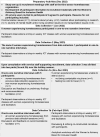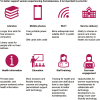An Intersectional Perspective on Digital Health: Longitudinal Narratives and Observations With Older and Middle-Aged Women Experiencing Homelessness
- PMID: 39869439
- PMCID: PMC11973565
- DOI: 10.1093/geront/gnaf021
An Intersectional Perspective on Digital Health: Longitudinal Narratives and Observations With Older and Middle-Aged Women Experiencing Homelessness
Abstract
Background and objectives: People experiencing homelessness and older people encounter barriers as health and social care services are increasingly delivered online, however, there is limited knowledge about how this relates to older and middle-aged women experiencing homelessness, especially those from minoritized and/or migrant communities. We aimed to explore how technology, including digital health, can help or hinder older and middle-aged women to navigate paths through and out of homelessness.
Research design and methods: This 16-month qualitative longitudinal study utilized narrative interviews and participant observations with seven older and two middle-aged women experiencing homelessness, in London, England. Additionally, we observed interactions between the women experiencing homelessness and 2 information and communications technology class facilitators. We collected and analyzed data using a narrative, interpretative approach. An advisory board of women with lived experiences of homelessness supported the interpretation of findings and development of practice and policy recommendations.
Results: We present our findings as 3 composite narrative vignettes co-constructed with the participants: (1) "No, I'm not taking this telephone appointment"; (2) "Technology doesn't judge you"; and (3) "You have to be a digital person now." The findings illuminate determinants of digital health equity related to aging, gender, and migration status among older and middle-aged women experiencing homelessness.
Discussion and implications: Using an intersectional lens, we provide recommendations about how to better align digital health to the needs of older and middle-aged women experiencing homelessness. The findings will inform intervention development.
Keywords: Women’s health; digital divide; eHealth; homeless; qualitative research.
© The Author(s) 2025. Published by Oxford University Press on behalf of the Gerontological Society of America.
Conflict of interest statement
None.
Figures
Similar articles
-
Digital Interventions for Older People Experiencing Homelessness: Systematic Scoping Review.J Med Internet Res. 2025 Feb 21;27:e63898. doi: 10.2196/63898. J Med Internet Res. 2025. PMID: 39984162 Free PMC article.
-
Health Technology Access and Peer Support Among Digitally Engaged People Experiencing Homelessness: Qualitative Study.JMIR Hum Factors. 2024 May 14;11:e55415. doi: 10.2196/55415. JMIR Hum Factors. 2024. PMID: 38743937 Free PMC article.
-
A systematic narrative review of the research evidence of the impact of intersectionality on service engagement and help-seeking across different groups of women, trans women, and non-binary individuals experiencing homelessness and housing exclusion.PLoS One. 2025 Apr 24;20(4):e0321300. doi: 10.1371/journal.pone.0321300. eCollection 2025. PLoS One. 2025. PMID: 40273210 Free PMC article.
-
Challenges to discussing palliative care with people experiencing homelessness: a qualitative study.BMJ Open. 2017 Nov 28;7(11):e017502. doi: 10.1136/bmjopen-2017-017502. BMJ Open. 2017. PMID: 29183927 Free PMC article.
-
Exploring the experiences of changes to support access to primary health care services and the impact on the quality and safety of care for homeless people during the COVID-19 pandemic: a study protocol for a qualitative mixed methods approach.Int J Equity Health. 2021 Jan 10;20(1):29. doi: 10.1186/s12939-020-01364-4. Int J Equity Health. 2021. PMID: 33423682 Free PMC article.
Cited by
-
Supporting Older People Experiencing Homelessness and Memory Problems in Hostels: Learning From an Ethnographic Study.Gerontologist. 2025 Mar 25;65(4):gnae187. doi: 10.1093/geront/gnae187. Gerontologist. 2025. PMID: 39692208 Free PMC article.
References
-
- Aldridge, R. W., Story, A., Hwang, S. W., Nordentoft, M., Luchenski, S. A., Hartwell, G., Tweed, E. J., Lewer, D., Vittal Katikireddi, S., & Hayward, A. C. (2018). Morbidity and mortality in homeless individuals, prisoners, sex workers, and individuals with substance use disorders in high-income countries: A systematic review and meta-analysis. Lancet, 391(241), 241–250. https://doi.org/10.1016/s0140-6736(17)31869-x. - DOI - PMC - PubMed
-
- Andersen, I. C., Thomsen, T. G., Bruun, P., Bødtger, U., & Hounsgaard, L. (2017). The experience of being a participant in one’s own care at discharge and at home, following a severe acute exacerbation in chronic obstructive pulmonary disease: A longitudinal study. International Journal of Qualitative Studies on Health and Well-Being, 12(1), 1371994–1371913. https://doi.org/10.1080/17482631.2017.1371994 - DOI - PMC - PubMed
-
- Anderson, C., & Kirkpatrick, S. (2016). Narrative interviewing. International Journal of Clinical Pharmacy, 38(3), 631–634. https://doi.org/10.1007/s11096-015-0222-0 - DOI - PubMed
-
- Ashton, N. A., & McKenna, R. (2020). Situating feminist epistemology. Episteme, 17(1), 28–47. https://doi.org/10.1017/epi.2018.11 - DOI
-
- Atkinson, P., & Hammersley, M. (1994). Ethnography and participant observation. SAGE.
MeSH terms
Grants and funding
LinkOut - more resources
Full Text Sources
Medical



